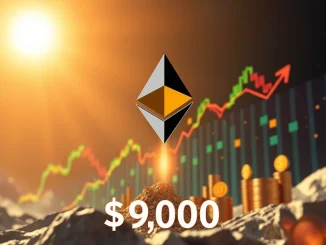
Dive into the fascinating intersection of cryptocurrency and global politics! The latest buzz from the decentralized prediction market, Polymarket, highlights a remarkable forecast for the upcoming South Korea election. This platform, built on blockchain technology, is seeing significant action on the race for the presidency, offering a unique perspective on perceived outcomes based on collective wagers.
What is Polymarket and Why Does it Matter for the South Korea Election?
Polymarket operates as a prediction market – a platform where users can wager on the outcomes of future events, ranging from sports results to political elections and even scientific discoveries. Unlike traditional polling, which surveys opinions, prediction markets like Polymarket reflect the aggregate beliefs of participants who are putting money on the line. The price of a share in a particular outcome on Polymarket indicates the market’s perceived probability of that event occurring.
For the South Korea election, Polymarket serves as a real-time barometer of how confident people are in different candidates winning, based on financial incentives rather than just expressing a preference. This makes the market activity surrounding Lee Jae-myung and his opponents particularly compelling.
Lee Jae-myung’s Overwhelming Lead on Polymarket
Currently, the data from the Polymarket market focused on the South Korean presidency paints a very clear picture. Traders are heavily favoring one candidate:
| Candidate | Party | Polymarket Probability |
|---|---|---|
| Lee Jae-myung | Democratic Party of Korea (DPK) | 97% |
| Kim Moon-soo | People Power Party (PPP) | 3% |
| Lee Jun-seok | Reform Party | 1% |
This shows a striking level of confidence in Lee Jae-myung among those trading on the platform. The market for this specific election outcome has attracted substantial attention, with the total amount wagered reaching an impressive $173 million.
The Significance of a $173 Million Prediction Market
The sheer volume of money involved in this Polymarket market is notable. A $173 million wager pool suggests significant participation and conviction from traders globally. While not a guarantee of the outcome, a high-liquidity prediction market can sometimes offer insights that differ from traditional polls, as participants are incentivized to be accurate with their predictions.
This activity highlights how decentralized platforms are finding real-world use cases, allowing individuals to speculate on or hedge against outcomes of major global events like the South Korea election.
Exploring the Potential and Limitations of a Decentralized Platform for Predictions
Using a decentralized platform like Polymarket for election predictions offers several potential benefits:
- Real-time Data: Probabilities update instantly as trades occur.
- Incentive Alignment: Traders are financially motivated to predict correctly.
- Global Participation: Accessible to anyone with an internet connection and crypto, potentially capturing broader sentiment than national polls.
However, it’s crucial to consider the challenges and limitations:
- Not Traditional Polling: This reflects the beliefs of market participants, not a representative sample of voters.
- Liquidity and Manipulation: While $173 million is large, markets can still be influenced by large players or specific groups.
- Regulatory Uncertainty: The legal status of prediction markets varies globally.
- Accessibility: Requires understanding crypto and using a decentralized platform.
Despite these points, the Polymarket data on the Lee Jae-myung vs. Kim Moon-soo vs. Lee Jun-seok race provides a fascinating, market-driven perspective on the perceived probabilities in the South Korea election.
Conclusion: What Does Polymarket’s Prediction Mean?
The overwhelming 97% probability assigned to Lee Jae-myung on Polymarket is a powerful signal from the prediction market community. With $173 million wagered, it represents a significant collective financial bet on the outcome of the South Korea election. While prediction markets are distinct from traditional polling and have their own set of dynamics and limitations, the data from this decentralized platform offers a compelling, real-time insight into how a segment of the global market perceives the likelihood of a Lee Jae-myung victory. It underscores the growing role of crypto-based platforms in allowing participants to put their money where their predictions are, even on major political events.



